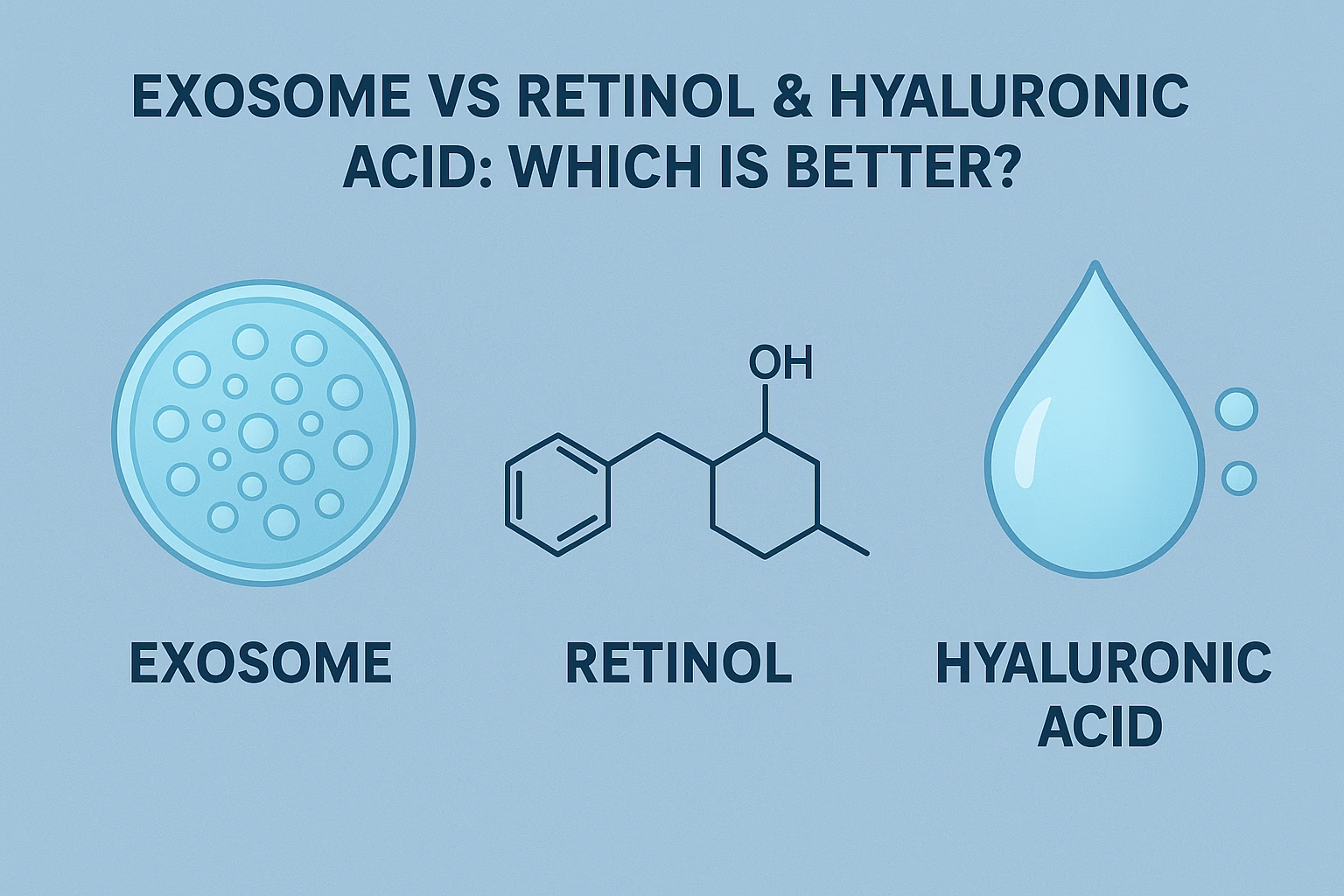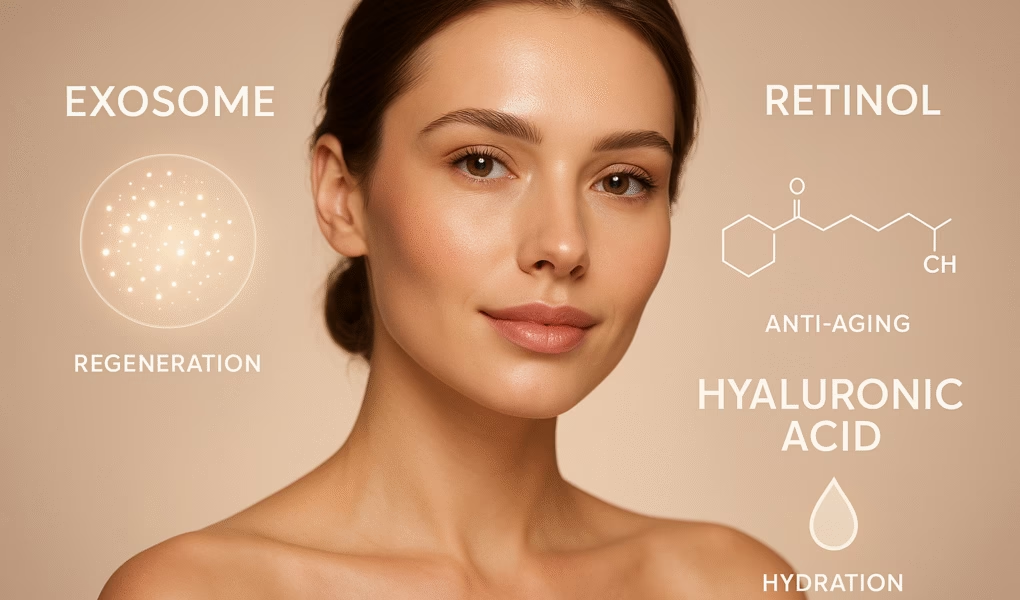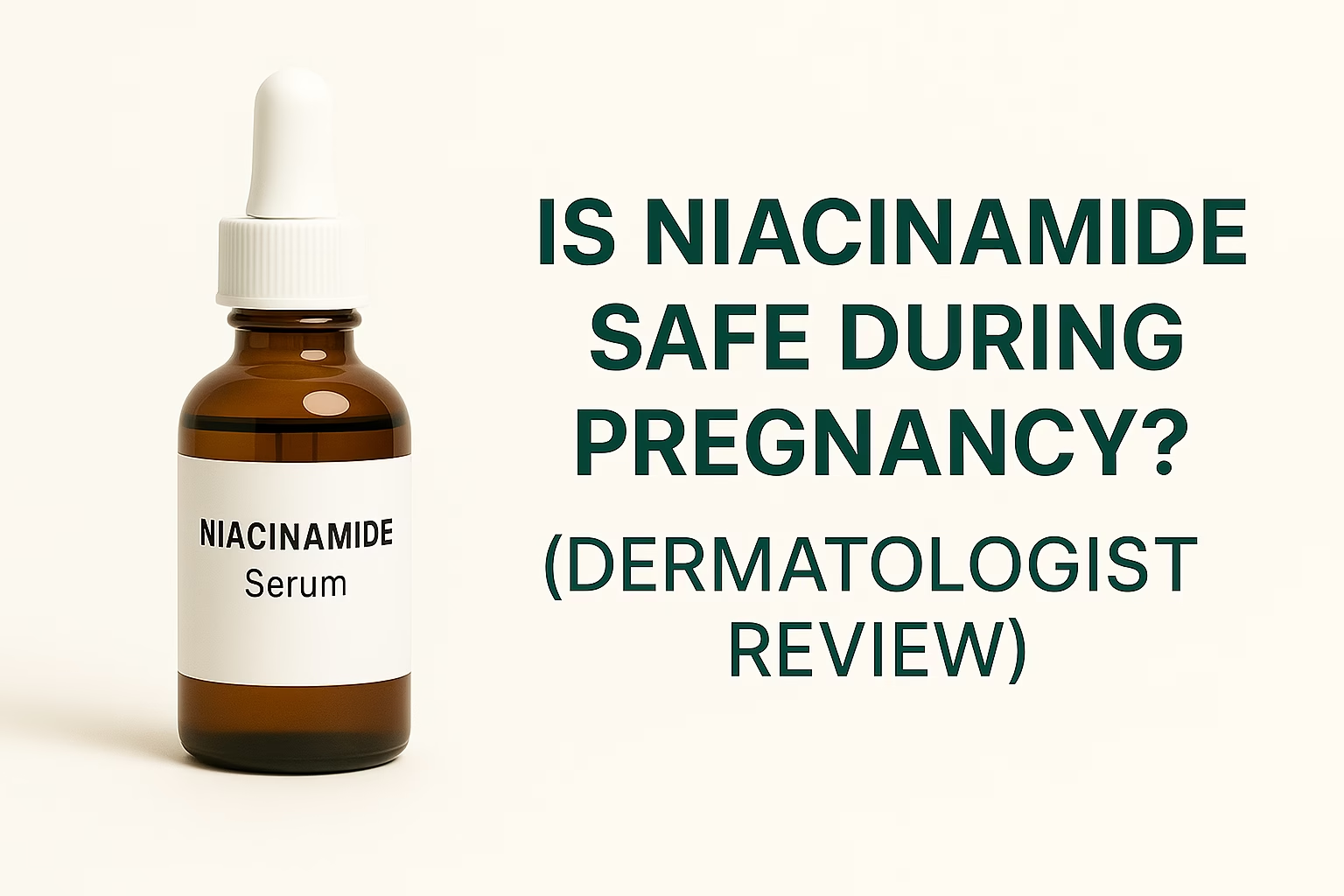The skincare world is buzzing with a big question: Are exosomes more powerful than traditional ingredients like retinol and hyaluronic acid?
With retinol known as the gold standard for anti-aging and hyaluronic acid praised for deep hydration, exosomes are now emerging as a futuristic alternative. But do they really outperform these tried-and-true ingredients? Let’s break it down.
What Are Exosomes in Skincare?
Exosomes are tiny extracellular vesicles naturally produced by our cells. They carry proteins, peptides, lipids, and growth factors that signal skin cells to repair, rejuvenate, and regenerate.
Unlike topical serums that sit on the surface, exosomes can penetrate deeper to stimulate collagen, reduce inflammation, and improve overall skin health.
👉 Learn more: What Are Exosomes in Skincare? Benefits Explained
Retinol: The Classic Anti-Aging Ingredient
Retinol (a vitamin A derivative) has long been the dermatologist favorite for reducing wrinkles and boosting cell turnover.
Benefits:
- Stimulates collagen production
- Improves fine lines & wrinkles
- Brightens dull skin
Drawbacks:
- Can cause redness, peeling, or irritation
- Not suitable for highly sensitive skin
- Results may take weeks to months
Hyaluronic Acid: The Hydration Hero
Hyaluronic acid is a powerful humectant that can hold up to 1,000x its weight in water. It’s found in countless moisturizers and serums.
Benefits:
- Deeply hydrates skin
- Improves elasticity and plumpness
- Works well for most skin types
Drawbacks:
- Effects are temporary (wear off after 24 – 48 hours)
- Doesn’t target wrinkles or pigmentation
- Works best when combined with other actives
Exosomes vs Retinol vs Hyaluronic Acid: Side-by-Side Comparison
| Feature | Exosomes | Retinol | Hyaluronic Acid |
| Main Function | Regeneration & healing | Anti-aging & cell turnover | Hydration & plumping |
| Depth of Action | Deep (cell communication) | Mid (epidermis & dermis) | Surface level |
| Best For | Aging, scars, sensitivity, inflammation | Fine lines, wrinkles, pigmentation | Dryness, dehydrated skin |
| Side Effects | Minimal (mild redness possible) | Irritation, dryness, peeling | Rare (sometimes stickiness) |
| Results Timeline | Visible in weeks | 6–12 weeks | Immediate (short-term) |
| Long-Term Benefits | Yes (stimulates repair) | Yes (with consistent use) | Limited |

Which Is Better for Your Skin?
- For Anti-Aging: Retinol is proven, but exosomes may deliver faster and deeper rejuvenation without irritation.
- For Hydration: Hyaluronic acid remains unbeatable for instant plumpness, while exosomes offer long-term hydration benefits by repairing skin barriers.
- For Sensitive Skin: Exosomes win here since retinol is often too harsh.
- For Comprehensive Skincare: Using exosomes + hyaluronic acid together may provide the perfect blend of repair and hydration.
👉 Related: Exosome Serum for Anti-Aging: Before & After Results
👉 Related: Exosome Therapy for Skin Rejuvenation: Does It Really Work?
Expert Insights
Dermatologists are cautiously optimistic about exosomes. According to the American Academy of Dermatology (AAD), early studies show that exosomes may enhance skin healing and reduce visible aging signs with fewer side effects compared to retinol.
📖 Reference: American Academy of Dermatology – Retinol & Anti-Aging
Meanwhile, research in PubMed suggests that exosomes may play a major role in regenerative dermatology, potentially revolutionizing future skincare.
📖 Reference: PubMed – Exosomes in Regenerative Medicine
FAQs on Exosomes vs Retinol & Hyaluronic Acid
Yes. Exosomes may reduce the irritation caused by retinol, making the combination more tolerable.
Many users report visible improvements in 2 – 4 weeks, whereas retinol may take 6 – 12 weeks.
Yes. Hyaluronic acid provides instant hydration, while exosomes work on long-term skin regeneration.
Current research suggests they are safe with minimal side effects, but more long-term studies are needed.
Final Verdict
- If you want fast hydration → Hyaluronic Acid.
- If you want proven anti-aging but can handle irritation → Retinol.
- If you want cutting-edge regeneration with fewer side effects → Exosomes.
In 2025, exosomes aren’t replacing retinol and hyaluronic acid – they’re complementing them in advanced skincare routines.
✨ The future of skincare might just be a blend of traditional actives + regenerative exosome therapy.
✍️ GlowNest Care Team
This guide on Exosome vs Retinol & Hyaluronic Acid was created by the GlowNest Care Team. We specialize in simplifying complex skincare science from trusted staples like retinol and hyaluronic acid to emerging innovations such as exosome therapy. Our mission is to provide clear, research-backed insights so you can choose the right treatments for healthier, radiant skin.
📖 Read More: Explore our latest skincare tips, haircare routines, mani-pedi care guides, overall beauty care advice, weekly glow tips, FAQs on trending topics, and handy beauty calculators to keep your glow strong.
🔗 Share This Post: Found it helpful? Share it with friends, family, or on social media to spread the knowledge and inspire healthier skin.
💬 Join the Discussion: Have questions or experiences to share about your skincare routine? Drop your thoughts in the comments, we’d love to hear from you!



